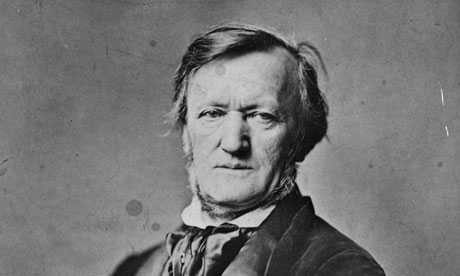
It was intended to break a seven-decade unofficial boycott and smash an enduring cultural symbol of the Nazi era. But the first performance of works by Richard Wagner, Hitler's favourite composer, by an Israeli symphony orchestra in the Jewish state was never likely to be a harmonious event.
And now it has been thwarted. Tel Aviv University, the venue for a symposium on the German composer on 18 June culminating in a musical performance, has cancelled the booking made by the Israel Wagner Society following a wave of protests.
The university claimed it had been misled by the organisers. "We recently found out, to our astonishment, that the event is actually a concert during which the works of German composer Richard Wagner are to be performed," it said in a letter released to the media. "You deliberately concealed this important detail from us, as well as the topic of the event and the exact name of the organisation behind it."
Public objections had contributed to the decision, the university added. "We have received complaints and angry protests calling for the cancellation of this controversial event, which crosses a red line and would deeply offend the Israeli public in general, and Holocaust survivors in particular. As you know, this is a highly sensitive public issue, particularly in Israel, where there are so many Holocaust survivors."
Jonathan Livny, the founder of the Israel Wagner Society, gave his response to the Guardian: "Total disgust." He said he had made the programme and the identity of its organisers clear in email correspondence with the university. "The excuse that they didn't know is totally ludicrous and an outright lie," he said.
"But that's a technicality. The issue is that here is an academic institution that is threatened daily with boycotts because of Israel's policy in the occupied territories doing exactly the same thing: imposing a boycott."
Israel, he said, had complained about calls in the UK for a boycott of the Israeli Habima theatre company's recent production of Shakespeare's The Merchant of Venice at London's Globe Theatre. "Isn't that the same as boycotting this music?"
Among those lodging complaints was the Holocaust Survivors' Centre, which said it was intolerable for music heard in Nazi concentration camps to be played in concert in the Jewish state. "This is emotional torture for Holocaust survivors and the wider public in the state of Israel," said a letter from Uri Chanoch, the centre's deputy chairman, to the president of Tel Aviv university.
"Wagner provided inspiration for the Nazis, and there is a direct link between him and the Holocaust," Chanoch told Haaretz. "I am 85 and at an age such as this, the memory of the distant past is even brighter than the memory of things which happened yesterday."
Although Wagner died decades before Hitler's rise to power, his music is closely identified with the Nazis. The composer was an ultra-nationalist and a renowned antisemite, writing of "the harmful influence of Jewry". An unofficial Wagner ban was introduced in 1938 by the predecessor of the Israel Philharmonic following the Kristallnacht pogrom.
Previous attempts to perform Wagner in Israel have been met with protests and walkouts. In 2001, the celebrated Jewish conductor Daniel Barenboim led a performance of Wagner in an encore at the Israel Festival after warning the audience of what was to come and inviting those who objected to leave. Some walked out in protest, some gave a standing ovation.
Last summer, the Israeli Chamber Orchestra performed Wagner's Siegfried Idyll at the Bayreuth festival in Germany. Conductor Roberto Paternostro, who lost many members of his family in the Holocaust, said his aim was "to divide the man from his art."
Livny, 65, also drew a distinction between the individual and his music. "I have no regard for the composer – he was the worst kind of antisemite and I despise him. But God gave him a wonderful gift with which he wrote this beautiful, sublime music."
Livny's father escaped Nazi Germany in 1938, carrying with him to Israel his Wagner records and passing on to his son a love of the music. The society, which according to Livny has many Holocaust survivors among its members, wanted to reclaim the composer. "The only remaining symbol of the Nazis is Wagner, and I want to take that away," he said.
It was hypocritical of Israelis to boycott Wagner but ride on German-built trains and drive German-made cars, and for the state to buy German submarines, he said. "Wagner is the last taboo."
Around 100 musicians had been hired on individual contracts specifying the performance of Wagner, which was to have been conducted by Asher Fisch. People had bought tickets "with the express intention of listening to this music". The society was now facing a substantial loss. "I will sue the university, but the real issue here is not financial," Livny said.

